Messenger of Maritime Silk Road Culture - "Zhai Mingfei Suona and Love"
Zhai Mingfei is a young performer of the Chinese Orchestra of Tianjin Song and Dance Theater. He has performed with the group in more than 50 countries and regions, showing the charm of traditional Chinese musical instruments to the world.
On Douyin, her account "Zhai Mingfei Suona and Love" has gained 360,000 followers. Through the live broadcast, Zhai Mingfei is changing the stereotype of suona among many young people. At the same time, she also used the income from the live broadcast to give back to the society, leading her fans to provide assistance to children in flood-stricken areas and poor mountainous areas within their ability.
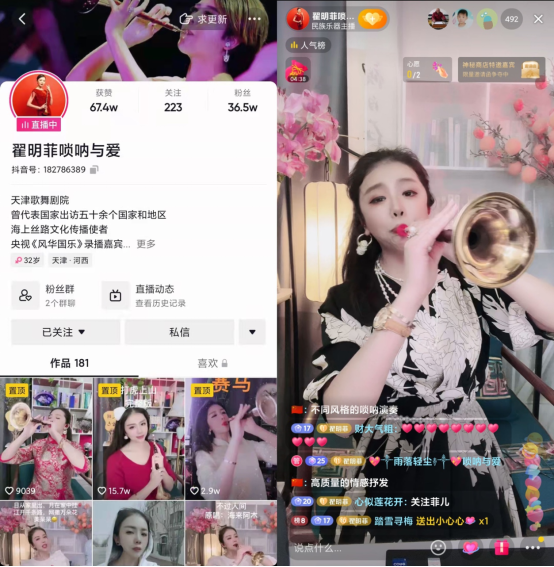
A song "Da Jujube", three techniques, played in 50 countries
Zhai Mingfei was born in a family of opera in Shandong, and learned suona with his father at the age of 6.
The suona was played loudly, fearing that it would affect the neighbors, so his father took Zhai Mingfei to the fields and the canal to practice the exercises every day before dawn. On a winter morning, the cold wind was piercing to the bone. The frostbite on Zhai Mingfei's hand holding the suona healed and became long, and the back of his hand was full of pus. The mother felt distressed and did not want her to continue practicing suona. The father insisted on strict requirements, "We all practiced this way."
His father's teaching allowed Zhai Mingfei to accumulate a solid young skill. But she really liked suona after she left home at the age of 9 to study at the art school in Tai'an.
Leaving home at a young age, Xiao Mingfei's loneliness of missing his relatives has no one to tell, so he can only vent by blowing suona. In those few years, she learned to use suona to express her feelings: "All my emotions and emotions can be pinned on suona. When I am happy, I can blow cheerfully and loudly, and when I am down, I can whimper softly."
When Zhai Mingfei was 12 years old, the teacher who taught suona wanted her to learn the performance skills of "three heads busy" and inherit the singing "Da Jujube".
"Da Jujube" is a traditional representative song of Suona, which expresses the joyful scene of people talking and laughing when the jujube is harvested. The song reflects the three age groups of the elderly, middle-aged and children in the scene through the playing of the card pipe, suona and whistle.
The so-called "three heads are busy" refers to the need to quickly switch the playing methods of card pipe, suona and whistle when playing. This not only requires proficiency in the three instruments, but also holds the iron whistle in the mouth. A little careless whistle will get stuck in the throat and cause danger, so few players can master this skill.
The teacher learned this song through oral teaching from the older generation of performers, and wanted the students to pass it on. However, many of Zhai Mingfei's brothers and sisters felt that this song was too "earthy" and difficult to play, and they were unwilling to learn it.
At first, Zhai Mingfei also hesitated. But she listened to this piece over and over again, and the more she listened, the more she wanted to learn it, and to learn it well.
During the first two months of practice, Zhai Mingfei's upper jaw was rubbed with blood blisters by the whistle in his mouth, and it hurt when swallowing and chewing. He could only eat liquid food every day. For six months in a row, she spent 5 hours practicing "Da Jujube" every day before she mastered the tune.
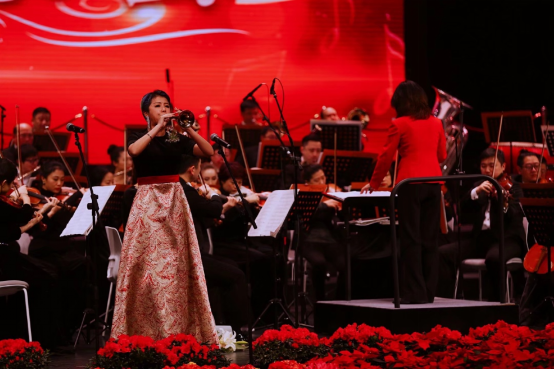
After practising his skills day after day, Zhai Mingfei was admitted to the Tianjin Song and Dance Theater after graduating from the art school: "There were about six suonas who came to the test at that time, some graduated from the Central Conservatory of Music and Tianjin Conservatory of Music, and they played all the suonas. For the modern tune, I was the only one who played 'Three Busy'.
At the Tianjin Song and Dance Theater, Zhai Mingfei traveled with the orchestra to almost every primary and secondary school in Tianjin, playing and explaining Chinese music to children, so that they can understand Chinese traditional music and traditional musical instruments. She has also performed in more than 50 countries with the visiting group, and brought "Da Jujube" with Chinese folk music skills to all over the world. The Chicago Concert Hall in the United States, the National Exhibition Center in Cuba, and the Bremen and Ludwig Concert Halls in Germany have all left the aftertaste of "Dating Dates".
The live broadcast of suona makes young people fall in love with Chinese music, and donate the income to the flood-stricken mountain
At the beginning of 2020, the new crown epidemic caused many people's work to be suspended, and the same is true for art workers who want to perform offline performances. The performance was suspended and the unit couldn't go back. Zhai Mingfei felt very anxious: "I also want to contribute to the fight against the epidemic, but I can't do anything except donate some money."
In the next few months, a friend suggested that Zhai Mingfei open a Douyin account, "to exert one's energy on this platform, and do whatever can be done." She hesitated for a moment, thinking that she could help netizens to calm down through music, and also let everyone listen to different suona performances, so she began to share the video of playing suona on Douyin.
After the account accumulated three or four hundred fans, Zhai Mingfei began to broadcast live on Douyin. For the first live broadcast, there were only five people in the live broadcast room. Zhai Mingfei didn't feel that there were too many people. She happily played suona music: "Even if one or two people hear me playing suona, it proves that I am not idle, and I am playing my own way. light and heat."
She began to live on Douyin every day. Even if there were only a dozen netizens in the live broadcast room, she had to complete the prescribed "program list": first, a 20-minute skewer, and then the familiar "Hundred Birds Chaofeng" , and after that, there is the favorite "Fighting Tigers Up the Mountain" by Douyin fans.
"My biggest original intention in Douyin is to let everyone see different suona performances." Zhai Mingfei said. After becoming a professional performer, she found that many people's impression of suona still remained on the performance of weddings and weddings. In fact, every time she goes abroad to perform on behalf of Chinese folk music, her suona performance will shock foreign musicians and music lovers. In their opinion, the timbre of the suona can imitate a variety of different sounds and express strong joy and sadness, which cannot be accomplished with many foreign musical instruments.
Zhai Mingfei also tried to adapt traditional music and create new music in offline performances and TV programs to show more styles of suona. On CCTV's "Fenghua Chinese Music" program, she played "Liang Liang" in a tactful and beautiful way, breaking through the sound of suona in conventional performances, and also led many suona players to try various styles of suona performance. After entering Douyin, she hopes that she can use a variety of performances to change the views of netizens on suona.

On Douyin, Zhai Mingfei has performed many works adapted by herself. "Fighting Tigers Up the Mountain" is the most popular among netizens, and it is also the one that incorporates the most emotions in her adaptation.
In the Spring Festival of 2007, when she returned to her hometown to celebrate the New Year, her father sang an excerpt from Peking Opera "Fighting Tigers Up the Mountain" at the New Year's Eve dinner, and her grandmother sang along with her. Zhai Mingfei could see that his father particularly liked this part, but his voice was not so high.
She always remembered this piece of music in her heart, and later adapted it into a suona performance, making up for her father's lack of pitch with the high-pitched and bright timbre of the suona.
"It was three or four o'clock in the morning after I finished recording and finished the song that day. When I sent it to my dad, he cried. I actually wanted to keep it as a souvenir, but I didn't expect my dad to like it so much."
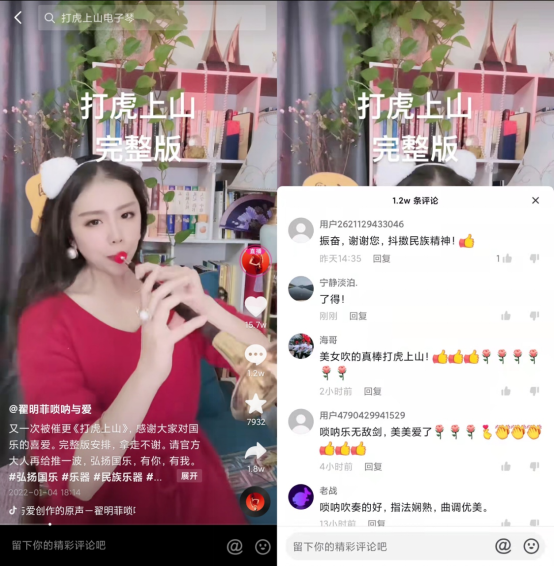
There are also countless folk music fans and Douyin netizens who like this piece of music. Every time Zhai Mingfei publishes a performance video related to this piece of music, it will get hundreds of thousands of likes from netizens. "Music is played with emotion and without emotion, and the degree of moving people is absolutely different. So during the live broadcast, I also played every piece of music very carefully, and I absolutely couldn't cope with it." Zhai Mingfei said.
Diversified playing styles have earned Zhai Mingfei the attention of 360,000 netizens on Douyin. Among them are not only middle-aged and elderly people, but also many young people of "post-90s" and "post-00s". Zhai Mingfei will connect with the "post-00" anchors in the live broadcast, so that young people can also have the opportunity to learn about Chinese music; he will also connect with musicians who play flute, erhu and other musical instruments to play together, so that netizens have a richer experience.
"Beginning about three years ago, there have been more and more suona creators on the short video platform, which has also led more people to learn suona, which has changed the situation when we were young." Zhai Mingfei said that in the eyes of many Douyin fans, Playing the suona became a cool thing. Netizens often send her private messages and leave messages, hoping that she can start classes and teach netizens and their children how to play suona.
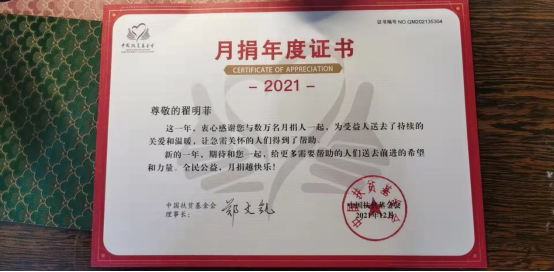
The live broadcast has been live for a long time, and gradually some netizens will reward Zhai Mingfei and send small gifts in the live broadcast room to express their love. Zhai Mingfei also uses the live broadcast income to give back to the society and help others. During the heavy rain in Henan in July last year, she did a public welfare live broadcast on Douyin, donating all the live broadcast income of more than 2,300 yuan that day to the Henan Charity Federation to help prevent and fight floods. In October last year, Shanxi suffered a flood disaster. She donated 1,000 yuan to the Shanxi Charity Federation for flood control and disaster relief, and posted the donation certificate and record on Douyin to publicize it to fans.
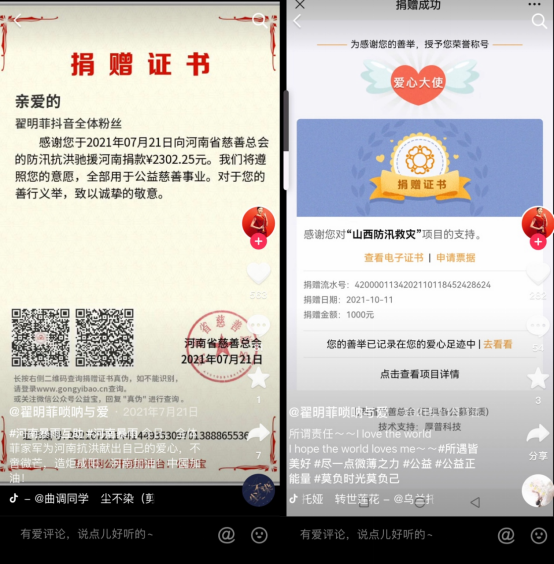
Zhai Mingfei, who was born in the countryside, not only uses the live broadcast to reward her income to improve the lives of her parents, to help her little nephew go to school, but also to help children in the mountainous areas as much as she can. Since 2019, she has developed the habit of donating 5 free lunches to children in the mountains every day. In 2021, she will donate to the children in Sanqingshan, and has donated thousands of free lunches so far.
"When I didn't come to Douyin, I have been donating free lunches to children in the mountains. But it's hard to do these things better with my own salary. I can only divide my salary into several and take out a part. Add a few lunches to the children every day. The income from the live broadcast allows me to do these things without any worries, and it can also help more people." Zhai Mingfei said.
 渝公网安备 50010702504639号
渝公网安备 50010702504639号